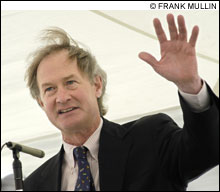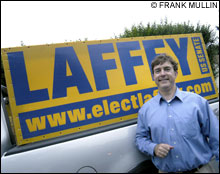
Senator Lincoln Chafee

Mayor Stephen P. Laffey |
Viewing the two recent televised debates between US Senator Lincoln Chafee and his GOP challenger, Cranston Mayor Stephen P. Laffey, was akin to taking a brisk 60-minute trip through psychiatrist Elizabeth Kubler-Ross’s five stages of grieving.Denial prevails at the outset since it’s unbelievable that Chafee allows himself to come across as such a flibbertigibbet. This gives way to anger over the possibility of a rout by the smoother and mechanistically prepared Laffey. Mental bargaining commences about the likely outcome of the general election. This yields to depression over how Chafee — one of a handful of remaining moderate Republicans in the Senate — has heavily relied on negative advertising by his campaign and surrogates, rather than a more forceful articulation of core values. And then, by the time when Laffey overreaches and Chafee reasserts some basic decency worthy of his family name, you find acceptance that nothing much has really changed in the prevailing calculus of the GOP primary race. In other words, Chafee probably has a slight edge.
Saturday’s 7 pm debate on WJAR-TV (Channel 10) unfolded in similar fashion as an earlier one on WPRI-TV (Channel 12). Eschewing the spasmodic hand movements of the first battle, Chafee still came across initially as enough of a stylistic Gump to inspire cringing. Laffey, meanwhile, steadily displayed his mastery as a rhetorician, nimbly framing a question about strains with a brother who had died from AIDS in the context of commonplace familial conflicts. A little later, he gamely invoked John F. Kennedy while responding to a question about his view of religion in public life.
It’s no wonder that Laffey occasionally laughed while parrying, as if he could not believe his good fortune. Chafee, indeed, sounded feckless at times, reading from notes about what constitutes a just war and trying to make an issue of how an image of a Laffey critic was digitally wiped from the candidate’s Web site.
Again, one could only wonder why Chafee didn’t turn his stylistic flaws to his advantage by saying, for example, “I may not speak as quickly as the mayor, but it took guts to be the only Senate Republican to vote against the war in Iraq. I take no satisfaction in how my worst fears have been realized.”
Slowly, though, as the two candidates bogged down in charges and counter-charges, Chafee landed some blows, outlining a broadly appealing form of Republicanism based on fiscal responsibility, environmental protection, keeping the government out of people’s private lives, and avoiding foreign entanglements.
Laffey, meanwhile, seemed scripted (asked about his view of Republicanism, he predictably said, “I would just refer to myself as a reformer and maybe a populist.”) He gratuitously dropped JFK’s name no fewer than seven times, while also, as is his wont, making references to Teddy Roosevelt, Ronald Reagan, and for good measure, Bobby Kennedy.
Laffey ultimately revealed his core conservatism when he lauded President George W. Bush’s $1.5 trillion in tax cuts, the vast majority of which have benefited the rich. “The proof of the tax cuts is in the pudding,” he insisted, since the productivity of American workers is up, as is government revenue. “The tax cuts have worked.”
What Laffey fails to acknowledge is how, as the New York Times reported as its lead story on Monday, “The current expansion has a chance to become to become the first sustained period of economic growth since World War II that fails to offer a prolonged increase in real wages for most workers.” The story went on to note, “Wages and salaries now make up the lowest share of the nation’s gross domestic product since the government began recording the data in 1947, while corporate profits have climbed to their highest share since the 1960s.”